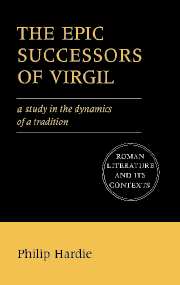Preface
Published online by Cambridge University Press: 05 June 2012
Summary
This is a short book on some very long poems written in the first 130 years of the Roman empire: Ovid's Metamorphoses, Lucan's Bellum Ciuile, Statius' Thebaid, Valerius Flaccus' Argonautica, and Silius Italicus' Punica. My aim above all is to throw light on the dynamics of a tradition. Tradition is often felt negatively as a dead weight; I shall have succeeded if I encourage in my reader a sense that these monstrous poems are possessed of a restless and fertile energy and that close to the surface of their hides there is stretched an intricately sensitive nerve-system.
In literary terms the source of this dynamism is Virgil's Aeneid. One of the greatnesses of this apparently definitive Roman epic is its ability to spawn a vigorous progeny. The successors to Virgil, at once respectful and rebellious, constructed a space for themselves through a ‘creative imitation’ that exploited the energies and tensions called up but not finally expended or resolved in the Aeneid. In historical terms epic flourished because it answered to many of the political and ideological concerns of the first century A.D. Epic and the empire share a number of obsessions: the search, never fulfilled, for a final perfection and equilibrium amidst the instabilities of power; the difficulty of distinguishing between good and evil; anxiety about the succession. Repetition, witting and unwitting, characterizes imperial Roman history as much as it does an imitative literary tradition.
- Type
- Chapter
- Information
- The Epic Successors of VirgilA Study in the Dynamics of a Tradition, pp. xi - xiiPublisher: Cambridge University PressPrint publication year: 1992

